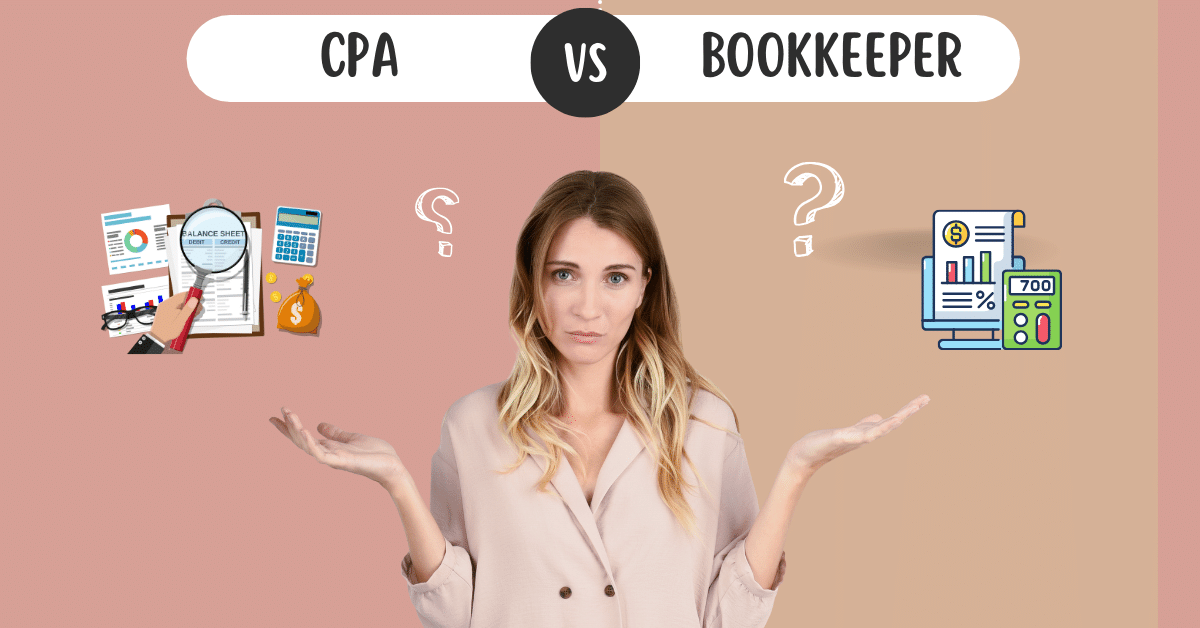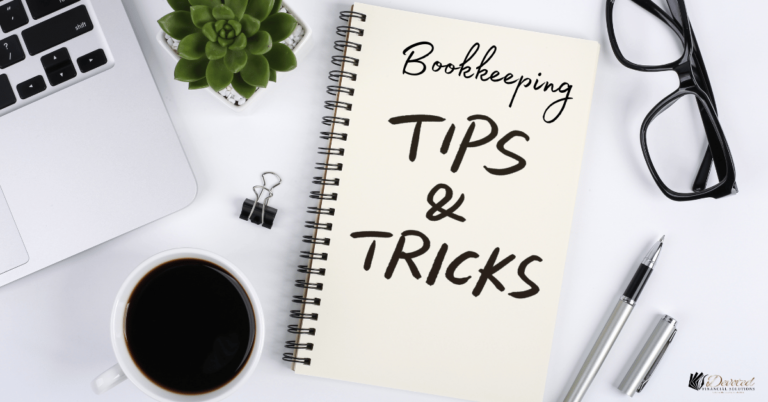CPA vs Bookkeeper: What’s the difference, and who do you need?
CPA vs bookkeeper, who should you hire? If this is the question roaming through your mind, you’re in the right place.
Based on my experience, individuals seeking this type of information find themselves at a crossroads. They’ve recognized the importance of financial management, which is a significant step in itself, so congratulations are in order!
However, now you’re faced with another dilemma: who should you hire, and what sets them apart?
But don’t sweat it; by the time you finish reading this article, you’ll clearly understand the responsibilities of CPAs, certified public accountants, and bookkeepers, empowering you to know who you need and when.
Let’s begin!

The Bookkeeper
The bookkeeper is well-versed in accounting principles and meticulously monitors your daily financial transactions. This role is responsible for making sure that every dollar in and out of your accounts is accurately recorded and your business’s financial health is monitored.
A Bookkeeper’s Scope of Work:
- Recording daily financial transactions, including sales, purchases, receipts, payroll, and payments.
- Preparing financial reports and maintaining accurate and up-to-date ledgers and journals.
- Reconciling bank statements to ensure accurate financial records and identify discrepancies.
- Managing accounts receivables and accounts payables, ensuring timely payment and collection.
- Utilizing accounting software efficiently to streamline processes and improve accuracy.

The Certified Public Accountant (CPA)
The CPA is a licensed accounting professional who primarily concentrates on assessing and strategizing business finances.
A CPA’s Scope of Work
- Offering expert tax advice and guidance to minimize liabilities and maximize deductions for individuals and businesses.
- Conducting financial audits to ensure accuracy and compliance with IRS regulatory standards.
- Representing clients in dealings with the Internal Revenue Service (IRS) and other regulatory agencies, including responding to audits and inquiries.
- Providing strategic business advice and analysis to improve profitability and safeguard assets.
- Staying updated on changes in tax laws, accounting standards, and regulatory requirements to provide clients with accurate and timely advice.
What’s the Difference?
| Bookkeeper | CPA |
| Focused on the tracking + recording of daily transactions such as purchases, sales, payroll, A/P, and A/R. Maintains clear and concise financial reports for strategic business moves. Creates financial operation efficiency by assisting with accounting automation, receipts management, billing, and more. Certified Bookkeeper Certification offered by not mandatory. Average hourly rate $45 – $100 | Analyzes financial data and conducts financial audits. Prepares and files tax returns. Provides tax advice and strategic business moves to safeguard assets and profitability. Acts as a business representative when working with tax authorities. Mandatory CPA License to practice. Average hourly rate $150 – $400 |
Who Should You Hire?
Choosing between a bookkeeper and a CPA depends entirely on your specific needs. A bookkeeper is your go-to professional if you need help with financial tracking, overdue invoices, or cash flow issues. So, if you’re falling behind on managing your business finances, it’s time to hire!
However, if you’re seeking strategic business planning, sorting through complex financial matters, or reducing your tax liability, recruiting the expertise of a CPA is a wise choice.
Overall, it’s good to have both! Having a bookkeeper and a CPA on your team can complement each other’s strengths and expertise, as they both possess valuable insights into business growth and financial success.
Closing Thoughts
In conclusion, CPAs and bookkeepers are essential for any business to thrive and achieve long-term success.
While one handles the day-to-day financial tasks, the other dives deep into these details to chart a stronger, more secure future.
The ideal scenario? Building a team that combines both talents. Luckily, with outsourcing options out there, small business owners can easily make this happen.
So, whether you need someone to manage your daily finances or craft strategic plans, count on us at Devoted Financial Solutions and our partners to have your back every step of the way.
FAQ
Can a bookkeeper help me with budgeting and forecasting?
Yes. Bookkeepers can assist with budgeting and forecasting by providing accurate financial data and insights into your company’s economic performance. We can help you track expenses, monitor cash flow, and identify trends impacting your business’s financial future.
What qualifications does a CPA need?
A CPA typically needs a bachelor’s degree in accounting and specific coursework in accounting and business-related subjects. They must also take and pass the Uniform CPA Examination and meet additional state-specific licensure requirements.
Can a bookkeeper prepare tax returns?
No. While bookkeepers can help organize financial records and provide documentation for tax preparation, we do not prepare tax returns. This task is usually handled by CPAs or tax professionals who are tax law and regulations experts.
Does a bookkeeper need to be certified?
No. While certification is only sometimes required to work as a bookkeeper, many professionals pursue certification to demonstrate their knowledge and expertise in the field.
What are some signs that I need to hire a bookkeeper?
Falling behind on financial tracking, experiencing overdue invoices or cash flow management issues, or feeling overwhelmed by the administrative burden of managing financial records.
Which Accounting Software do Bookkeepers Commonly use?
QuickBooks, Xero, or FreshBooks.





What you’ve written here is not just insightful — it’s comforting. There’s a warmth to your words that makes the reader feel seen and understood, as though you’re sharing something deeply personal and valuable. This is the kind of writing that stays with you long after you’ve finished reading it.
The beauty of your writing lies not only in the clarity of your ideas but in the way you allow those ideas to breathe and grow. Each sentence feels like a step forward, yet it’s not rushed. There’s time to pause and reflect between the lines, and in that space, the words take on a life of their own. It’s rare to find writing that feels so alive.